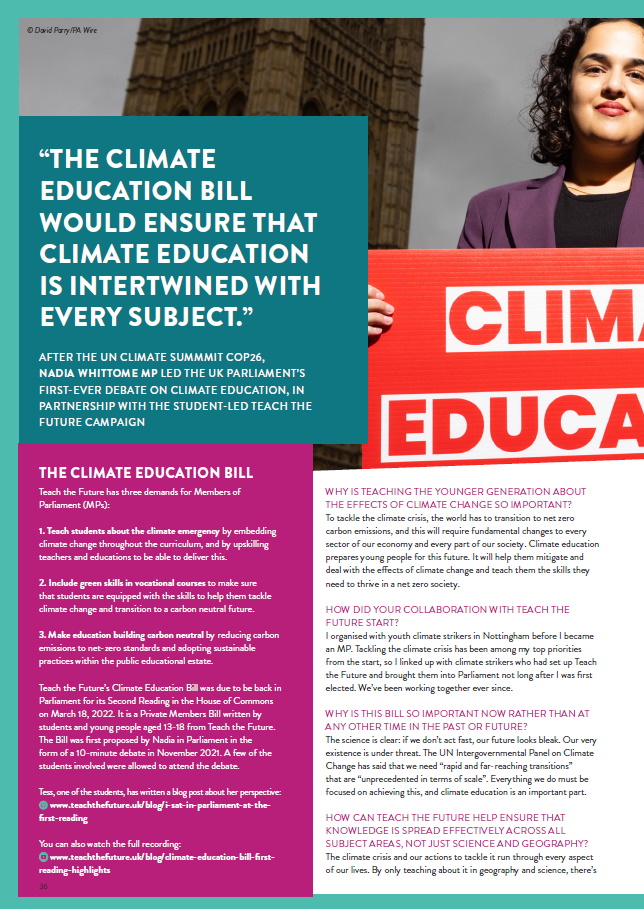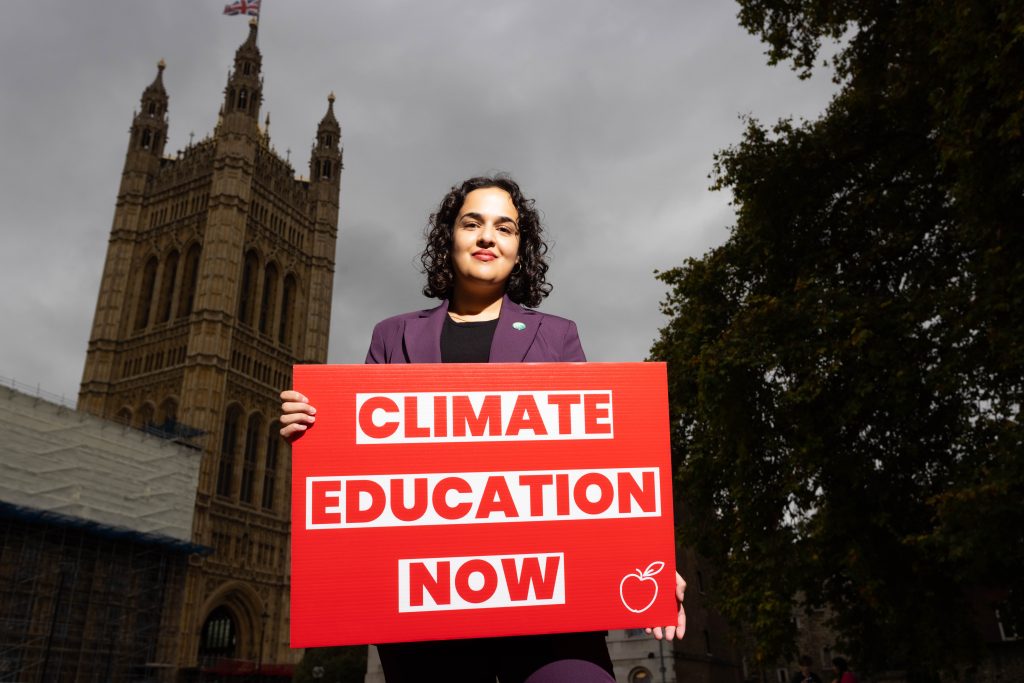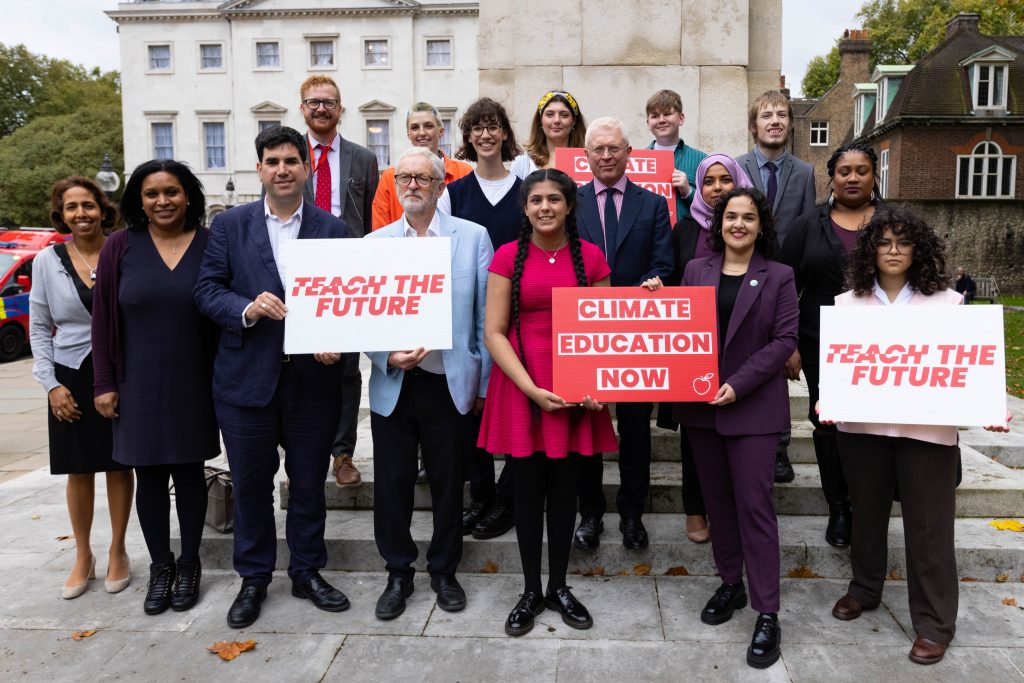“The climate education bill would ensure that climate education is intertwined with every subject.”
After the UN Climate Summit COP26, Nadia Whittome MP led the UK Parliament’s first-ever debate on climate education, in partnership with the student-led Teach the Future campaign
THE CLIMATE EDUCATION BILL
Teach the Future has three demands for Members of Parliament (MPs):
1. Teach students about the climate emergency by embedding climate change throughout the curriculum, and by upskilling teachers and educations to be able to deliver this.
2. Include green skills in vocational courses to make sure that students are equipped with the skills to help them tackle climate change and transition to a carbon neutral future.
3. Make education building carbon neutral by reducing carbon emissions to net-zero standards and adopting sustainable practices within the public educational estate.
Teach the Future’s Climate Education Bill was due to be back in Parliament for its Second Reading in the House of Commons on March 18, 2022. It is a Private Members Bill written by students and young people aged 13-18 from Teach the Future. The Bill was first proposed by Nadia in Parliament in the form of a 10-minute debate in November 2021. A few of the students involved were allowed to attend the debate.
Tess, one of the students, has written a blog post about her perspective: www.teachthefuture.uk/blog/i-sat-in-parliament-at-thefirst-reading
You can also watch the full recording:
www.teachthefuture.uk/blog/climate-education-bill-firstreading-
highlights
WHY IS TEACHING THE YOUNGER GENERATION ABOUT THE EFFECTS OF CLIMATE CHANGE SO IMPORTANT?
To tackle the climate crisis, the world has to transition to net zero carbon emissions, and this will require fundamental changes to every sector of our economy and every part of our society. Climate education prepares young people for this future. It will help them mitigate and deal with the effects of climate change and teach them the skills they need to thrive in a net zero society.
HOW DID YOUR COLLABORATION WITH TEACH THE FUTURE START?
I organised with youth climate strikers in Nottingham before I became an MP. Tackling the climate crisis has been among my top priorities from the start, so I linked up with climate strikers who had set up Teach the Future and brought them into Parliament not long after I was first elected. We’ve been working together ever since.
WHY IS THIS BILL SO IMPORTANT NOW RATHER THAN AT ANY OTHER TIME IN THE PAST OR FUTURE?
The science is clear: if we don’t act fast, our future looks bleak. Our very existence is under threat. The UN Intergovernmental Panel on Climate Change has said that we need “rapid and far-reaching transitions” that are “unprecedented in terms of scale”. Everything we do must be focused on achieving this, and climate education is an important part.
THE CLIMATE EDUCATION BILL
Teach the Future has three demands for Members of Parliament (MPs):
1. Teach students about the climate emergency by embedding climate change throughout the curriculum, and by upskilling teachers and educations to be able to deliver this.
2. Include green skills in vocational courses to make sure that students are equipped with the skills to help them tackle climate change and transition to a carbon neutral future.
3. Make education building carbon neutral by reducing carbon emissions to net-zero standards and adopting sustainable practices within the public educational estate.
Teach the Future’s Climate Education Bill was due to be back in Parliament for its Second Reading in the House of Commons on March 18, 2022. It is a Private Members Bill written by students and young people aged 13-18 from Teach the Future. The Bill was first proposed by Nadia in Parliament in the form of a 10-minute debate in November 2021. A few of the students involved were allowed to attend the debate.
Tess, one of the students, has written a blog post about her perspective: www.teachthefuture.uk/blog/i-sat-in-parliament-at-thefirst-reading
You can also watch the full recording:
www.teachthefuture.uk/blog/climate-education-bill-firstreading-
highlights
To tackle the climate crisis, the world has to transition to net zero carbon emissions, and this will require fundamental changes to every sector of our economy and every part of our society. Climate education prepares young people for this future. It will help them mitigate and deal with the effects of climate change and teach them the skills they need to thrive in a net zero society.
HOW DID YOUR COLLABORATION WITH TEACH THE FUTURE START?
I organised with youth climate strikers in Nottingham before I became an MP. Tackling the climate crisis has been among my top priorities from the start, so I linked up with climate strikers who had set up Teach the Future and brought them into Parliament not long after I was first elected. We’ve been working together ever since.
WHY IS THIS BILL SO IMPORTANT NOW RATHER THAN AT ANY OTHER TIME IN THE PAST OR FUTURE?
The science is clear: if we don’t act fast, our future looks bleak. Our very existence is under threat. The UN Intergovernmental Panel on Climate Change has said that we need “rapid and far-reaching transitions” that are “unprecedented in terms of scale”. Everything we do must be focused on achieving this, and climate education is an important part.
HOW CAN TEACH THE FUTURE HELP ENSURE THAT KNOWLEDGE IS SPREAD EFFECTIVELY ACROSS ALL SUBJECT AREAS, NOT JUST SCIENCE AND GEOGRAPHY?
The climate crisis and our actions to tackle it run through every aspect of our lives. By only teaching about it in geography and science, there’s a risk young people will think that climate change is something that only geographers and scientists need to worry about.
The Climate Education Bill would ensure that climate education is intertwined with every subject, a golden thread that runs through a young person’s schooling, whether learning about food security in food technology lessons, eco-anxiety in PSHE, or reading accounts of climate impacts in English.
WHAT EFFECT DID THE COVID-19 PANDEMIC OVER THE PAST TWO YEARS HAVE ON THE CAMPAIGN?
The pandemic has taken up a lot of time and focus for me as an MP, which meant there wasn’t as much time for me to work on projects relating to other areas, like the Climate Education Bill. But Teach the Future never stopped campaigning throughout the pandemic, and I’m so pleased that in the last few months we’ve been able to make real progress with the Bill.
WHAT ARE SOME OF THE MAJOR ACHIEVEMENTS OF THE TEACH THE FUTURE CAMPAIGN IN THE PAST YEAR?
From my perspective, the level of support that we’ve built together around the Climate Education Bill has been a significant achievement. The Bill is supported by the three most relevant select committee chairs – Environmental Audit Committee, Education Committee, BEIS Committee – two of whom are Conservative MPs. The Labour Party officially supports the Bill, and Green, Lib Dem and SNP MPs are also backing it.
ITALY HAS MADE CLIMATE EDUCATION A REQUIREMENT FOR ALL STUDENTS. WHAT WILL IT TAKE TO ACHIEVE THE SAME OUTCOME IN THE UK?
Making climate education compulsory requires enough pressure to be put on the government to make this a reality. Our campaign has built support from many different areas and over the next few months we will continue to increase the pressure.
GETTING SOME PEOPLE – INCLUDING STUDENTS AND TEACHERS – TO CARE MORE ABOUT CLIMATE CHANGE MAY REQUIRE SIGNIFICANT BEHAVIOURAL NUDGING. HOW CAN/WILL THAT BE ADDRESSED?
The whole point of the Bill is that whether or not you’re taught about climate education will no longer depend on how passionate your teacher is about it. It will become part of the national curriculum. We are also advocating for schools and teachers to be provided with resources to help them feel confident about providing climate education.
WHAT ARE THE NEXT STEPS FOR YOU, THE TEACH THE FUTURE CAMPAIGN AND CLIMATE EDUCATION IN THE UK?
The Bill was back in Parliament for its second reading on 18th March. We’ll be continuing to campaign and build support, and we’ll be engaging with the government about their forthcoming education strategy.
 ABOUT NADIA WHITTOME
ABOUT NADIA WHITTOME
Nadia is a British Labour Party politician and MP for Nottingham East. She was elected to Parliament in 2019 when she was just 23 years old, which made her the UK’s youngest MP.




